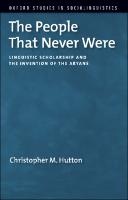Explore

The People That Never Were: Linguistic Scholarship and the Invention of the Aryans takes the reader through the history of the concept Aryan, beginning with colonial scholarship in India around 1800, and ending in the first decades of the twentieth century. The book shows how Aryan emerged as a free-standing explanatory device, and a key to historical narratives of superiority and inferiority. History came to be understood as consisting of peoples or races with assigned characteristics and world views. The book takes apart the arguments for the existence of an Aryan race or people in ancient times, focussing in particular on the role of philologists in offering distorted readings of ancient Sanscrit texts. It shows that Aryan came into English around 1840, promoted primarily by F. Max Müller, whose own conceptual confusions subsequently were projected back onto ancient India and at the same time read into contemporary Europe. The conclusion looks at the academic debate today, notably in relation to scholarly authority and to the insider/outsider dichotomy that seemingly pits Western Indology against Hindu nationalism. It suggests that historical linguistics no less than race theory is based on a series of profound conceptual errors. Myths about Aryan perpetuated by scholars over two centuries have distorted our understanding of British colonialism in India as well as of Nazi ideology.
This book is included in DOAB.
Why read this book? Have your say.
You must be logged in to comment.
Rights Information
Are you the author or publisher of this work? If so, you can claim it as yours by registering as an Unglue.it rights holder.Downloads
This work has been downloaded 6 times via unglue.it ebook links.
- 6 - pdf (CC BY-NC-ND) at OAPEN Library.
Keywords
- thema EDItEUR::C Language and Linguistics::CF Linguistics::CFF Historical and comparative linguistics
- thema EDItEUR::J Society and Social Sciences::JB Society and culture: general::JBC Cultural and media studies::JBCC Cultural studies::JBCC9 History of ideas
Links
DOI: 10.1093/oso/9780190212988.001.0001Editions

